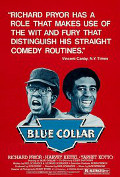
Directed by
Paul Schrader
114 minutes
Rated MA
Reviewed by
Bernard Hemingway

Blue Collar
Paul Schrader is known for frequenting the morally shady side of the street both as a screenwriter, notably of Taxi Driver (1976) and as a director of films such as American Gigolo,1988 and Auto Focus, 2002. Blue Collar, his debut effort as a director, points him in the right direction for this although it is an awkward start Initially seeming to be a comedy it gradually evolves into more serious material but the transition is clumsy and the film despite some individually effective parts does not cohere into an effective whole.
Zeke Brown (Richard Pryor), Jerry Bartowski (Harvey Keitel) and Smokey James (Yaphet Kotto) work in low-paid jobs in a small Detroit car assembly plant. Disaffected by their pay and conditions and even more so by their union, they decide to burgle the latter's office. They get very little money but accidentally score a trophy in the form of a ledger which itemizes the union’s connection to organized crime. They decide to blackmail the union but soon discover that it’s not as easy as they assumed.
Somewhat ironically, the best part of the film, co-authored by Schrader with his brother Leonard , is established with the opening credits which depicts the auto factory in production while Captain Beefheart barks out a pounding “Mannish Boy" style blues (for which Jack Nitzsche, Ry Cooder and Schrader get a credit), a device which Is recurs at various times throughout the story.
Unfortunately the film’s weakest link is also introduced very early in the piece and that is Richard Pryor, a well-known stand-up comedian of the day who specialized in potty-mouthed nigger jive talk and does so here with great abandon, with Keitel and Kotto entering into the spirit of what presumably is intended to be taken for working class realism but feels more like a blue blue collar sit-com (Schrader keeps showing segments for Good Times, a popular all-black sitcom of the day and even more oddly, even if more characteristically Schrader, a sex party). All this, at least from today’s perspective, when such humour has long-since been mainstreamed is, at best, mildly diverting.
The trouble is that once the plot starts to move with the robbery and the men find themselves truly compromised Schrader is unable to convincingly shift the tone from the comedic to the paranoid so that though we get the point of their situation intellectually we aren’t emotionally engaged by what are in actually very dark developments.
Apparently disowned by Schrader the film was a troubled production mainly due to Pryor and by its end none of the principals were talking to each other off camera. That aside, less overt comedy at the outset (which basically means better casting) might have improved the film which surprisingly was critically well-received in its day although it failed at the box-office.
FYI: Martin Ritt's Norma Rae, another and much more successful union-themed film, albeit with a far more benign point-of-view, came out later the same year.
Want something different?





